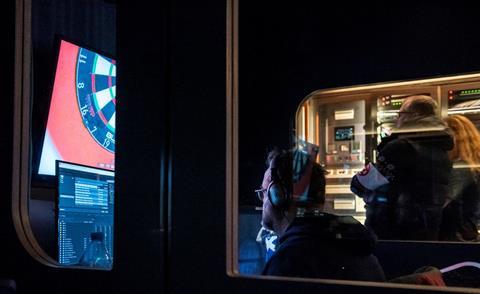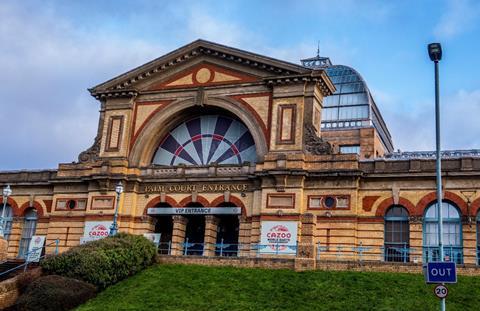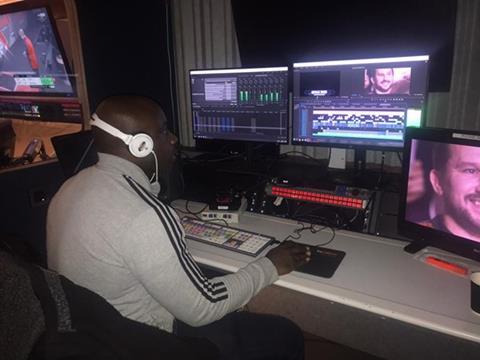Sky Production Services reveals how the annual Alexandra Palace event is produced

Sky Sports and Sky Production Services (SPS) again delivered the World Darts Championships this year, with 1.02 million tuning in to see Michael Smith lift the trophy this year.
This time round, the competition was broadcast in HDR for the first time, with SPS sending experienced sports editors to the OB to edit on location, and we caught up with them on the day of the final to check out how they got on this year and find out a little more about the realities of editing at this landmark competition.
All of the editors, Michael Dufour, Trevor Hart, Murat Kebir, Paul Ludden, Ernesto Rogata, have worked on the World Darts Championship for years, seeing the coverage of the tournament evolve during that time.
Hi everyone! Tell us about the WDC – has anything been different for you this year?
Rogata: “It’s the first time when things are fully back to normal after the pandemic, so there’s that old feeling of cosiness and camaraderie, which basically means being in each other’s pockets, but in a good way!”
Ludden: “This year was a fairly similar to previous, although we were back on-site after partly editing at [Sky] Osterley due to the on/ off covid restrictions of recent years. It was nice to be back, especially as I now live close to the Ally Pally. Although I won’t be cycling there again after underestimating the hills last year!”

How does editing on location differ from editing in a suite at Sky?
Kebir: “The OB is very different from editing at Sky. There are many tight deadlines, all the jobs have to be done very quickly. A couple of my jobs were on air 2 to 3 minutes after I delivered them.”
Hart: “It’s extremely time sensitive which means having to work faster and with a more intense workload, so it pays to be prepared.”
Dufour: “It brings a different type of pressure because you know that every edit is TX critical and delivery times are much earlier than normal. You also have to adapt to the atmosphere of editing in such a lively arena where the crowd are very audible.”
Rogata: “It’s real teamwork. It couldn’t work any other way.”
What’s it like being at the heart of the action in the OB truck?
Hart: “The trucks are very open and collaborative. Editors can easily see the work going on in the other suites, and we can exchange ideas more freely. It comes with the caveat of being a more bustling environment to work in but that’s not a bad thing.”
Kebir: “I normally bring my own sound cancelling headphones, it’s quite hard to concentrate on the sound of the edit sometimes without noise cancelling headphones.”
Ludden: “I prefer the lay out of the new trucks with us all being in the same room. It feels like more of a team effort, plus I can lean on a colleague if I’ve any issues.”
Dufour: “It always astounds me how they get all that kit on the truck. Hats off to the engineers!”
How has your experience of the OB changed year on year?
Rogata: “I have done it for so long (15 years) that things have changed quite a bit. People have changed too, of course. The darts used to be like an intimate club, where the same group of people would meet time and time again. All that’s changed now and there is a much broader, more varied team. Tech has also changed of course. My first darts OB was on an old Avid ingesting from SD Digi Beta tapes… now, we are on Premiere working in HDR.”
Hart: “The amount of material produced seems to have increased, with more APs and more content to be delivered. The new trucks are a more collaborative environment and certainly feels different to being isolated in small rooms at the end of the old trucks. Ally Pally hasn’t changed a bit though!”
Dufour: “It’s always an intense workload and that will never change but you do get used to it and try to be as prepared as possible for whatever may come.”
Rogata: “The darts is always fun. It is essentially a 10,000-person pub, the fancy dress is hilarious, the noise in the arena is deafening. It is however a family event and in all these years I have never heard or seen a fight or any other incident.”

What’s the best thing about being on the OB?
Hart: “The team are a great laugh and there’s a genuine atmosphere of camaraderie around the trucks. It is utterly exhausting but can be quite fun – we have a new team of APs and producers who have done an excellent job of keeping the spirit of darts alive.”
Rogata: “The best thing is the atmosphere. It’s hard work but everyone is in a good mood and really looking after each other. Roles are blurred. As editors we take the initiative and look for specific shots or music, supporting the producers’ role, and the assistant producers often give us very well edited sequences, so that we can quickly do some audio work, grading, add any graphics and have them sent out to the media manager in no time.”
Ludden: “It’s always fun to work on the darts, there’s so many characters. This year was probably the best final ever. I’m so happy Michael Smith finally won!”
What was your personal highlight of this year’s competition?
Rogata: “For me it’s usually one of the underdog stories. This year Alan Soutar has been amazing. He is a Scottish firefighter and was working shifts with his colleagues just a couple of days before being catapulted to the stage of the biggest darts event in the world. And he did very well, getting all the way to the last 16.”
Hart: “I did a banging little promo on it which allowed me to nerd out for a day!”
Dufour: “It’s always nice seeing your features go out in the Final.”
Ludden: “Having been in from 9am on finals day, we were given a clear once on air. On my way out - through the labyrinth of the Ally Pally - I passed four burly security guards escorting Michael Smith. I held the door for them and wished Bully Boy good luck. He nodded thanks, looking relaxed, heading to the stage for the big one. Well done Bully Boy!”




No comments yet